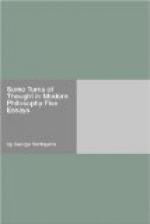I confess that formerly I had some difficulty in sharing the supreme respect for infinite Being which animates so many saints: it seemed to me the dazed, the empty, the deluded side of spirituality. Why rest in an object which can be redeemed from blank negation only by a blank intensity? But time has taught me not to despise any form of vital imagination, any discipline which may achieve perfection after any kind. Intuition is a broadly based activity; it engages elaborate organs and sums up and synthesises accumulated impressions. It may therefore easily pour the riches of its ancestry into the image or the sentiment which it evokes, poor as this sentiment or image might seem if expressed in words. In rapt or ecstatic moments, the vital momentum, often the moral escape, is everything, and the achievement, apart from that blessed relief, little or nothing. Infinite Being may profit in this way by offering a contrast to infinite annoyance. Moreover, in my own way, I have discerned in pure Being the involution of all forms. As felt, pure Being may be indeterminate, but as conceived reflectively it includes all determinations: so that when deployed into the realm of essence, infinite or indeterminate Being truly contains entertainment for all eternity.
M. Benda feels this pregnancy of the infinite on the mathematical side; but he hardly notices the fact, proclaimed so gloriously by Spinoza, that the infinity of extension is only one of an infinity of infinites. There is an aesthetic infinite, or many aesthetic infinites, composed of all the forms which nature or imagination might exhibit; and where imagination fails, there are infinite remainders of the unimagined. The version which M. Benda gives us of infinite Being, limited to the mathematical dimension, is therefore unnecessarily cold and stark. His one infinity is monochrome, whereas the total infinity of essence, in which an infinity of outlines is only one item, is infinitely many-coloured. Phenomena therefore fall, in their essential variety, within and not without infinite Being: so that in “returning to God” we might take the whole world with us, not indeed in its blind movement and piecemeal illumination, as events occur, but in an after-image and panoramic portrait, as events are gathered together in the realm of truth.
On the whole I think M. Benda’s two Gods are less unfriendly to one another than his aggrieved tone might suggest. This pregnant little book ends on a tragic note.




